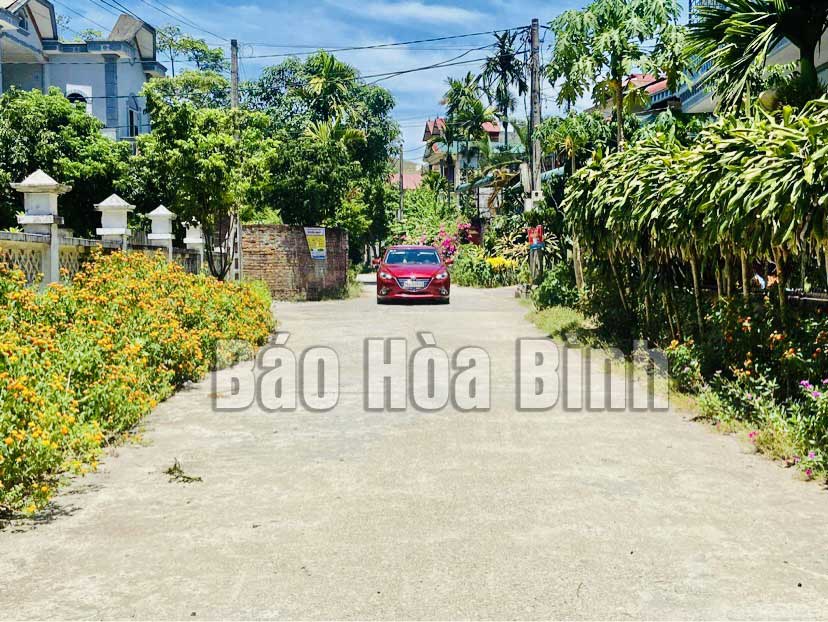
(HBO) – As a gateway of Hoa Binh province, Luong Son district is proud of revolutionary traditions that were built up during the wars against French and US forces. The district Party Committee, authorities and people have carried forward the traditions to surpass difficulties and contribute to the development of Hoa Binh, deserving its role as the province’s driving force region.

Luong Son district has been given a
facelift. Photo taken in Rong Can commune, Lam Son district
During the resistance wars, residents in Luong Son
joined hands with people nationwide to win the historic victory on April 30,
1975. A total of 7,452 young people in Luong Son joined the military. The
locality provided 12,300 tonnes of food and foodstuff for the battlefields. Its
military units and people also took part in the "Dien Bien Phu in the air”
campaign.
After the wars, despite a range of hardships,
all-level Party Committees, authorities and people in Luong Son have made
efforts to give a facelift to the district. In the 2015-2020 tenure, Luong Son
achieved many hallmark achievements.
Bui Quang Toan, Secretary of the district Party
Committee, said over the past five years, Luong Son completed 15 out of 18
targets set in the resolution of the 25th congress of the district's Party
organisation.
The locality posted high economic growth while
economic restructuring is on the right track. Luong Son has invested in
socio-economic infrastructure, helping to raise people’s living standards.
Its production value grew 13.86 percent during the
period and the scale of economic sectors expanded nearly 2.2 times.
In 2019, Luong Son district was recognised as a
new-style rural area, and Luong Son town and its expanded area won the
fourth-tier urban area status, one year ahead of schedule.
The district has continued to stay firm amid
difficulties caused by the COVID-19 pandemic in 2021. Local residents are
resolved to fulfilled the dual goal of pandemic prevention and control, and
production.
Luong Son has actively and flexibly taken preventive
measures at all levels to minimize losses.
A highlight of the pandemic combat in Luong Son is
the "Zero dong” shop model launched by the district’s youth union and labour
federation to mobilise donations from organisations and individuals in support
of needy people./.
The Standing Board of the Hoa Binh provincial Party Committee has agreed in principle on a proposal by the Standing Board of the Party Committee of Hoa Binh city to gather feedback on the city’s 1:2000 zoning plan, which forms part of its broader urban development strategy.
Hoa Binh province has made notable progress in public administration reform and digital government development, with the satisfaction index among citizens and businesses reaching over 84%, according to recent government evaluations.
Thanks to great efforts by local authorities in recent times, the governance and public administration performance of Mai Chau district has been significantly improved.
In the afternoon of June 6, the Party Committee, the People's Council, the People's Committee and the Fatherland Front of Lac Son district solemnly held a meeting to celebrate the 139th anniversary of the district's founding (1886–2025) and the 79th anniversary of the establishment of the district's Party Committee (1946–2025). There was the attendance of Mr. Bui Van Thang, the Vice Chairman of the Provincial People's Council; Mr. Quach Tat Liem, the Vice Chairman of the Provincial People's Committee; Ms. Dang Bich Ngoc, the Deputy Head of the National Assembly Delegation of the province; as well as the former leaders of the province and district through various periods, who are the natives of the district.
Implementing the Politburo’s Resolution No. 57-NQ/TW on breakthroughs in science – technology, innovation, and digital transformation is a golden opportunity for the northern mountainous province of Hoa Binh to renew growth model, improve competitive edge and shorten digital gap.
Resolution 57-NQ/TW, issued by the Politburo on December 22, 2024, identifies sci-tech, innovation, and digital transformation as strategic breakthroughs to build a developed and prosperous nation. In Hoa Binh province, this spirit is not just a slogan, it’s being put into action through concrete initiatives that form a "new development triangle”: digital citizenship, digital economy, and digital administration.



